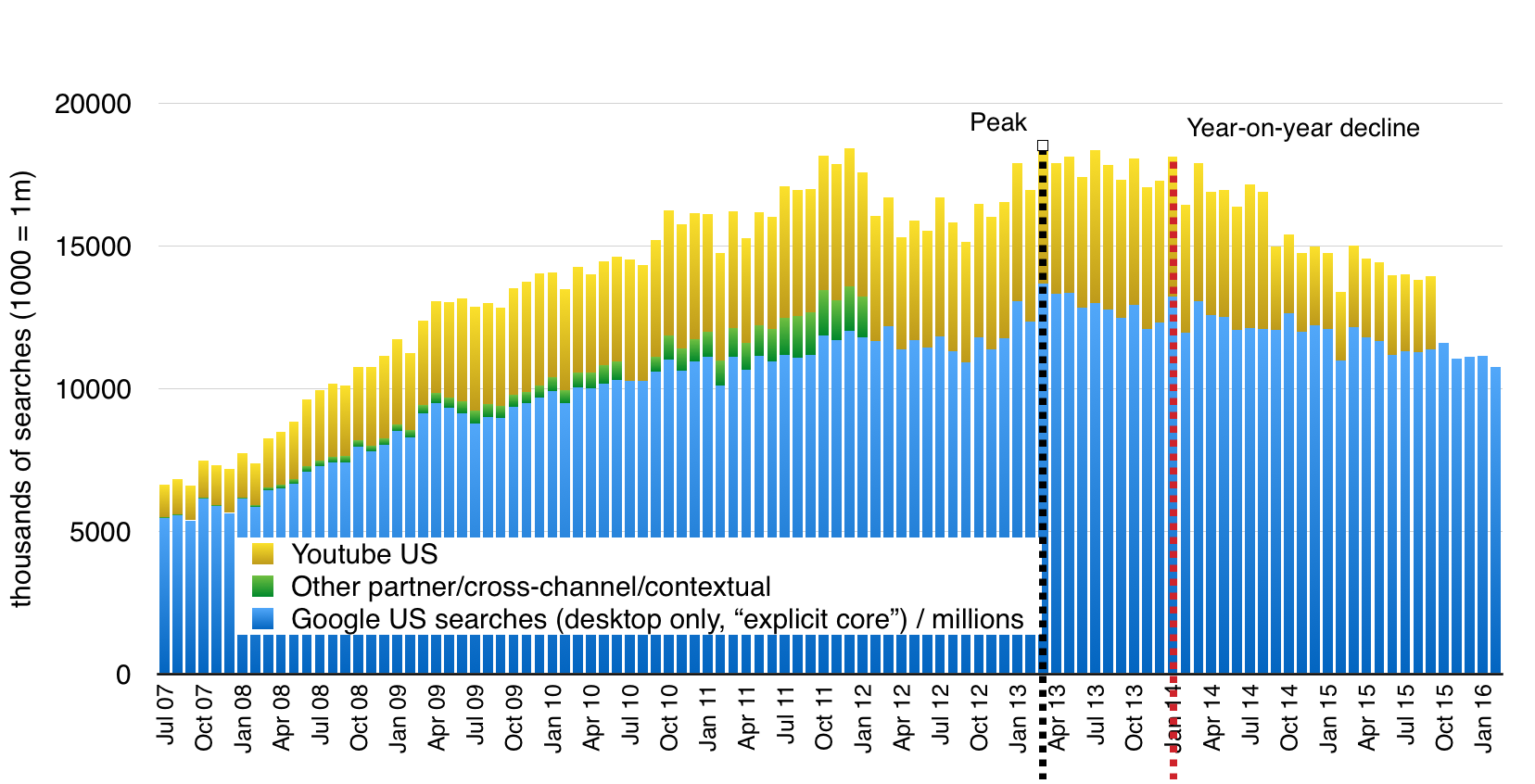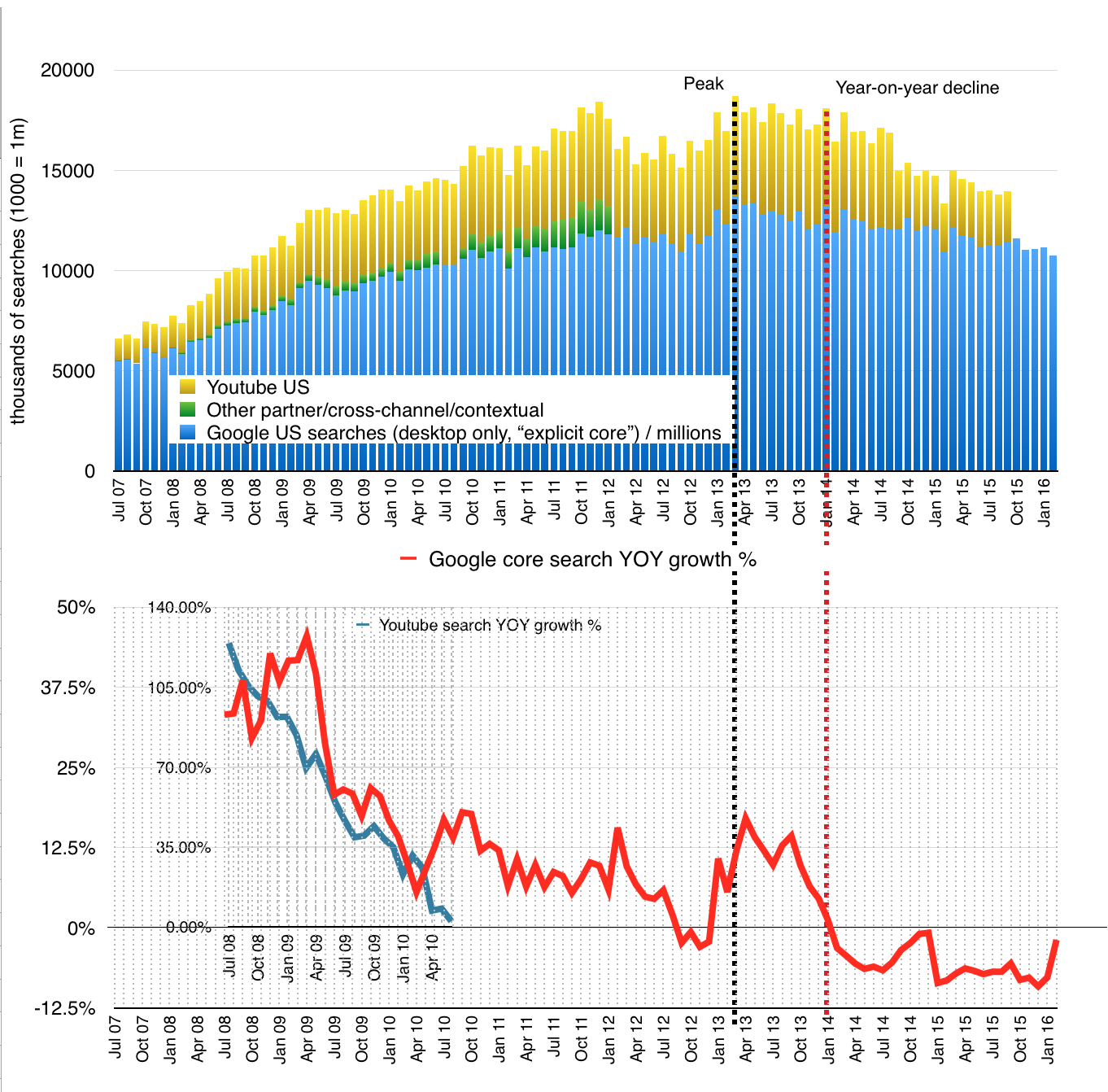
An iPhone, a keyboard: can Google replace Apple’s?
Casey Newton’s scoop at The Verge, revealing Google is developing a third-party keyboard for iOS, is one of those revelations which doesn’t surprise, it just slots in to make perfect sense. Of course Google would want a keyboard that would feed back the data about what users are searching for in return for fast searching. Especially on mobile and especially on iOS.
That’s because, as I pointed out via some straightforward calculations based on data Google gave out last year, on any given day more than 50% of people don’t do a single Google search on their mobile phone. By contrast, on any given day, more than 50% of people do at least one search on the desktop. (I did show my work, but in brief: if mobile search is bigger than desktop search, and there are 100bn searches per month, but more Google-capable smartphones than PCs, there are fewer searches per day on mobile than on desktop.)
We know, though, that mobile browser search ads don’t monetise as well for Google as desktop ones do. But there’s another problem for Google, at least in the US: people are doing fewer desktop searches.
That is the picture that emerges from studying data from ComScore, which provides monthly updates on browser share and number of searches carried out in the US. There’s an obvious, immediate criticism: this data doesn’t come from Google but instead from a third-party company which relies on people allowing it to monitor their web browsing habits. The key point though is even if the ComScore data is wrong (and it’s sure to be wrong in some way), it’s going to be consistently wrong, in a consistent way. It should be correct in the general trends it shows us.
With that in mind, take a look at the pattern of Google searches revealed by ComScore’s latest search engine rankings.
 Source: ComScore. Later data for YouTube and for ‘other’ sites (eg Blogger, shown in green) not available.
Source: ComScore. Later data for YouTube and for ‘other’ sites (eg Blogger, shown in green) not available.
Explicit problems
The labeling does need some explanation. ComScore says it measures “explicit core search” which, I was told by Andrew Lipsman at ComScore, is “just searches on the five core engines – Google, Yahoo, Bing, AOL and Ask.” (ComScore also has an “expanded view” which looks at searches on sites such as eBay, Amazon and Craiglist, but that’s for subscribers only)
The reason for shifting to “explicit” search was, in 2010 or so, he says, “Yahoo and Microsoft both began auto-generating searches as people navigated throughout their portals. For example, if somebody clicked on a slideshow about zebras, it might auto-generate searches below about zebras. Since there wasn’t really any intent with these searches, they generated almost no clicks but they were having a significant impact on overall search query volume. So we created a definition that excluded these searches as a better representation of the monetizable search market.” That means it includes searches via “browser bar” searches on Safari and Chrome, of course.
There are also “other” searches within Google’s network of sites – YouTube being by far the biggest, followed by Blogger, Picasa, Photos, Google+ and so on. But Lipsman suggests all but YouTube are insignificant compared to the activity on the main search engine (and YouTube).
Growth: gone
Growth on the desktop isn’t promising. According to the ComScore data, core search alone (not including YouTube or others), peaked in February 2013, and has been shrinking since January 2014. Desktop search on Google is now at the same level, by ComScore’s measure, as at the end of 2010.
 ComScore data says Google desktop search has been declining since January 2014
ComScore data says Google desktop search has been declining since January 2014
Two obvious questions: why is that? And what will Google do about it, given the pressure as a public company to keep delivering rising financial returns from its business when 90% of revenues (and perhaps more of profits) come from advertising around search?
The first – why – is pretty easy: mobile. ComScore’s other major public-facing dataset, on the installed base of smartphones in the US, shows that, since December 2010, ownership has risen from 63.2m, or 28% of adults, to 198.5m, or 79%. People who have a mobile phone in their hand are less likely to turn to a desktop to type a query. In fact, they’re not that likely to type a search query at all. Despite the presence of Google search in the Safari toolbar on iOS, and as a front page marquee feature on Android, most people go directly to apps such as Facebook, Twitter, Instagram or Amazon.
ComScore’s dataset tracking the use of the “Google search” app on smartphones in the US shows monthly use bumping along at between 53.5% and 47% of all iOS and Android users, respectively, with the average figure for January 2016 being 50.2%. On the desktop, it has around 64% search share in the US. (It’s much higher outside the US in countries where Google is the top-ranking search engine – up to 95% in some European countries.)
The second question – what will Google do about it, given the pressure to keep revenues rising – is pretty easy as well: pursue all possible avenues of extra monetization.
That’s why when you type pretty much any monetizable query into Google on desktop now you’ll be confronted with more ads directly above the search results than ever before: up to four, as well as the “OneBox” of Google-related subjects such as maps or YouTube videos. SEO analysis says that as a result, “click through rates for these ads should significantly rise” and “cost per click will rise”. Previously, when there were ads on the side of results, small advertisers could catch the searcher’s eye and get 5% of clicks despite having paid the lowest amount for their position.
On YouTube, Google has also become creative. After you watch one video, a “next” will play automatically and show an ad too. Google said YouTube revenue “continues to grow at a very significant rate” in its fourth-quarter results for 2015.
New avenues
What else can Google do? Given that desktop search is unlikely to come back, it has to explore all avenues on mobile and other formats. Which is why producing a keyboard for iOS makes perfect sense. It will be personalized, know what you type, and offer search results whenever you want – but the benefit to Google is any searches through the third-party keyboard won’t be part of its search deal with Apple. They’ll be pure profit.
Whether it will be popular is a different question. Even Google Maps isn’t that big a hit on iOS. If Apple’s report that only one-quarter of iPhone users use it is correct, that puts it at 13.4 million users on the iPhone in the US (because ComScore says that 53.8 million, or 28.1% of iOS users, used Apple Maps in January, consistent with a longer-term trend), against nearly 80 million on Android. We don’t have any data for takeup of third-party keyboards on iOS, but it’s doubtful they come close to that 7% Google Maps has on iOS.
In sum: it’s a nice idea – but may struggle to justify its development time. As Michael Love observed on Twitter after Newton’s scoop, “The people who want a keyboard that uses [Android font] Roboto and their favorite Material Design colors are already on Android.”

Thankfully, iOS will warn and warn the user of any insidious privacy intrusion attempts through the keyboard.
http://techcrunch.com/2014/10/04/everything-you-need-to-know-about-ios-8-keyboard-permissions-but-were-afraid-to-ask/
But what Google is counting on is that people will happily allow access. Lots of third-party keyboards demand full access, and (as with all warnings) we click through them without a care. (I use the Riffsy GIF keyboard, for GIFs.) What isn’t quite spelt out by Apple is whether those keyboards can only see what you type when they’re active – I suspect that that is the case, ie if they’re not active they don’t see your keystrokes.
Actually though, the issue with keyboard apps sending out keystrokes has precedent.
Back in Dec 2013, “Simeji” an Android keyboard to convert Japanese phonetics to Chinese characters (which is essential here) was caught in the act. “Simeji” was owned by Baidu and the data was being sent back to Chinese servers, to make matters worse. This was picked up by the mainstream media as well.
Simeji quickly stated that this was an unintended software “bug”. Also at the same time, other keyboard app makers, including Google, explicit stated that they do not send back keystrokes to their servers to alleviate consumer concerns. Also, since similar features have been present on PCs since forever, other software vendors issued similar statements.
If Google did release a keystroke capturing keyboard in Japan, that would immediately attract parallels to the Chinese. Definitely something to avoid.
I find it interesting though that although people have issue with privacy intrusions taking place on their phones, they seem oblivious to the fact that their search terms are being monitored just as closely, if not more.
One note to add. From a technical perspective, it should be trivial for Apple to add a feature or extension API so that privacy intrusive cookies could be scrambled or deleted when doing a search on Google. Of course this would not be the full solution, but Apple could be much more aggressive on online privacy if they wanted to.
I thought to some extent Safari already did that. Equally, Apple wouldn’t want to block people who actually want to do Google searches while signed in. You have to respect the decision of the user.
Safari’s cookie protection is limited to 3rd party cookies. They protect you to a limited extent from ad networks that track you when you are on a page with a banner, for example. I would prefer to be better protected.
Before that, Desktop in general “dying” (huge quotes here, both Desktop in general and Desktop Search are only dying for clickbait headlines, in reality they’re only ailing a little) is why they needed a mobile OS, too. I don’t think Desktop Search is doing anything but following Desktop’s trend. Mobile is actually more Googlized than Desktop thanks to Android, so I’m guessing on the whole Desktop’s loss of supremacy is a Good Thing for Google ?
“Mobile is actually more Googlized than Desktop thanks to Android, so I’m guessing on the whole Desktop’s loss of supremacy is a Good Thing for Google ?”
What’s your basis for saying that mobile is more “Googlized”? As I calculated, people do fewer searches on average on mobile than on desktop. Instead, they go straight to apps – Facebook, Instagram, Snapchat, Twitter, Tinder, etc. On mobile, they don’t search for those sites (which they honestly, truly do on the desktop, and then click the first result, or the result which has the “already visited” colour; it’s a free search for Google, and a free chance to show ads. That goes away on mobile).
That means fewer chances to show search ads on mobile, which means less revenue for Google. Good thing that video converts well on mobile; YouTube does well there.
If mobile were really “more Googlized” (or sufficiently so) then there wouldn’t be any, or much, impetus to do a Google keyboard for iOS.
I usually have dessert, even though I won’t staaaaarve if I don’t.
I’m guessing Google also like having more opportunities to track and show ads, w/o any lives being necessarily at stake. The transition to Mobile has been going on for a few years, Goog’s revenues have been growing all through it… I’m guessing the combination of Mobile searches + In-App ads + PlayStore revenues is working out OK ?
What Google has been doing is ramping up the number of ads shown on the desktop (you now need a big screen to see the first organic search result) and doing similar on mobile.
One simple answer is the money
mobile search are easier to monetize due the fact the majority of the search happen to be transactional compare to desktop it is not always a matter of how many keywords you type in the search box rather how many of them are transactional keywords which unlike in desktop in mobile is this almost 90% according to some source from Google
All the data from companies apart from Facebook suggests that mobile users are harder to monetise. Google has certainly struggled with this in the past.
I think you are confused about the fact that mobile is a new platform that is undeveloped in terms of monetization to it being diffict to monetize which I think is a lot of mistakes you guys are getting from Data it is better to look at the platefom by its potential instead is performance it took the Web more than 20 year to get to page rank
That mobile is newer than the desktop is not in dispute. Nor is its potential, since it’s potentially four or five times bigger than the desktop in terms of us. The question is how best to monetise it. Plus the fact that a lot of “transactional search” can happen in apps in a way that wasn’t the case on desktop.
How best to monetize it depends on what services you offer mobile has turn Google search and Map into a transaction base destination majority of search on mobile happen to be about products related hence add to that location, precision, payment and omnipotence of mobile mean more ability to drive transaction. Beyond communication and social media most other App aren’t used that much by much user
How can Google search be the 4th most popular app with billion user and dying besides the keyboard app has more to do with Google now on tap than getting keywords info something they can get plenty of already from YouTube
Google Search is the 4th most *installed* app on Google Play, and that’s because it’s preinstalled on every Google Android phone, and updated automatically from Google Play.
Being installed doesn’t necessarily mean being used, though. As lots of app companies can attest. The ComScore data on app use shows it at around 50%, as I mention in the article.
It’s the 4th most use app in IOS and Android behind only to Facebook YouTube messenger with billion monthly active user check the data no one was talking about app install which sometimes mean nothing
It’s the fourth most *installed*. I can’t find data for monthly active users of the Google Search app. If you have a link to that (not “downloads on the Google Play store”, but *monthly* *active* *users* of the Google Search app) please supply it. I can’t find one; my searches yield general data from the last earnings call in which Sundar Pichai said Gmail has a billion MAUs (http://www.theverge.com/2016/2/1/10889492/gmail-1-billion-google-alphabet). Or else claims from Google I/O in 2014 (http://seekingalpha.com/news/1817473-google-android-maus-top-1b-tablet-share-at-62-percent) – but that conflates search for desktop and mobile.
Downloads aren’t necessarily users.
Google own data points to search YouTube Gmail Map etc all have billion MAU also multiple public data about most use app always put search as 4th check it out
OK: even though you haven’t provided any data, let’s assume a billion monthly active users of Google search. Let’s even be more generous and assume they’re all on mobile (as well as the desktop).
Here’s the problem: “monthly active user” isn’t actually very active. That could describe someone who does one search per month. That would be 1 MAU. My calculations (linked in the article) suggest that on mobile, people do fewer searches per day on average than they do on the desktop. (Ask yourself how many searches you do on the desktop, and how many on mobile.) Fewer mobile searches means fewer opportunities to monetise.
It’s this fact that is important, and is the driver behind Google exploring all possible ways to incrementally increase its monetisation on mobile.
Not all search are equal you need to factor in the type of keyboard they get from each platefom mobile provide more transactional type of keyword than desktop somebody opening the search App on IOS can be many time more valuable than any other type of App due to the nature of search and the clear intent that comes with the user opening the search App